How to Support Wildlife During the Winter
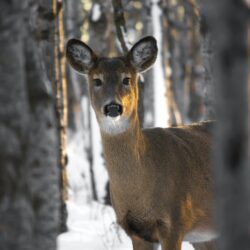 It goes without saying that the frigid months of winter aren’t just a struggle for people—they’re tough for animals and plants too! Reduced sunlight, extreme conditions like freezing temperatures and snow, and limited food sources make survival difficult.
It goes without saying that the frigid months of winter aren’t just a struggle for people—they’re tough for animals and plants too! Reduced sunlight, extreme conditions like freezing temperatures and snow, and limited food sources make survival difficult.
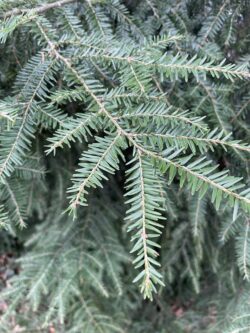
While most animals migrate, adapt, or hibernate to survive the winter months, plants don’t have the option of migration. Evergreen plants maintain their leaves with a waxy cuticle that prevents their leaves from drying out, while deciduous plants drop their leaves and go dormant. Perennial plants go dormant during the winter, while annual plants die and rely on their seeds to overwinter.
Animals require three things for survival: shelter, food, and water. Below are some suggestions to help make things a little easier for local wildlife during the cold winter months.
PROVIDE SHELTER
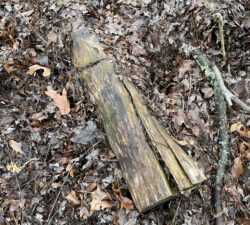 One simple way to help provide shelter for animals is to leave some areas of your yard a little “messy.” For example, refrain from clipping and removing all dead stems and leaves from your flower beds, and allow a pile of leaves, brush, or downed logs to remain in an out-of-the-way area of your yard.
One simple way to help provide shelter for animals is to leave some areas of your yard a little “messy.” For example, refrain from clipping and removing all dead stems and leaves from your flower beds, and allow a pile of leaves, brush, or downed logs to remain in an out-of-the-way area of your yard.
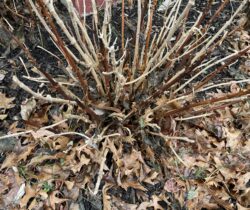 Many insects overwinter in leaf litter, so these simple practices provide both food sources and shelter for small animals. Leftover fall decorations such as a bale of straw provide overwintering habitats for insects, small mammals, and even salamanders! Evergreen plants also provide shelter for animals on cold winter days.
Many insects overwinter in leaf litter, so these simple practices provide both food sources and shelter for small animals. Leftover fall decorations such as a bale of straw provide overwintering habitats for insects, small mammals, and even salamanders! Evergreen plants also provide shelter for animals on cold winter days.
PROVIDE FOOD
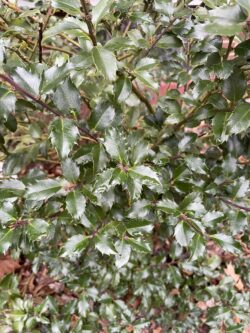
Bird feeders are a popular way to add food resources to the ecosystem—just make sure you keep them clean, so they do not spread disease. One easy way to add both food and shelter to your yard is by planting native trees and shrubs that persistently bear fruit.
American holly is a familiar evergreen shrub with red berries. Other shrub species that provide winter food and habitats are Winterberry holly, Red osier dogwood, hawthorns, crabapples, and native Viburnum species. Also, consider leaving some or all of your roses untrimmed, as rose hips are a good source of winter food.
PROVIDE WATER
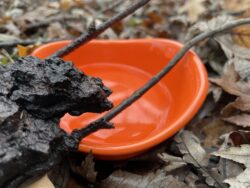 In areas near lakes and streams, animals are often able to remain sufficiently hydrated. In other areas, a shallow bowl of water outside can provide a much-needed resource for birds. Bird baths should be avoided during the winter, as they can lead to frozen feathers and hypothermia. Instead, place a nonmetallic grate or some dark rocks and twigs over and/or in a shallow water bowl to allow for drinking but not bathing. A safely heated bowl is another option.
In areas near lakes and streams, animals are often able to remain sufficiently hydrated. In other areas, a shallow bowl of water outside can provide a much-needed resource for birds. Bird baths should be avoided during the winter, as they can lead to frozen feathers and hypothermia. Instead, place a nonmetallic grate or some dark rocks and twigs over and/or in a shallow water bowl to allow for drinking but not bathing. A safely heated bowl is another option.
It doesn’t take much to help animals during the winter months. In fact, as described in some of the examples above, sometimes not doing something (like pruning or raking) is doing something! Even the smallest of efforts to help support local wildlife can make a significant difference.
If you have a question about local wildlife, feel free to reach out to our expert biologists and environmental scientists at 800.940.4025.
Few environmental firms in the country retain EnviroScience’s degree of scientific know-how, talent, and capability under one roof. The diverse backgrounds of our biologists, environmental engineers, scientists, and divers enable us to provide comprehensive in-house services and an integrated approach to solving environmental challenges—saving clients time, reducing costs, and ensuring high-quality results.
Our client guarantee is to provide “Excellence in Any Environment” meaning no matter what we do, we will deliver on our Core Values of respect, client advocacy, quality work, accountability, teamwork, and safety. EnviroScience was created with the concept that we could solve complex problems by empowering great people. This concept still holds true today, as our scientists explore the latest in environmental legislation and regulations and incorporate the most up-to-date technology to gather and report data.
EnviroScience expertise includes but is not limited to: aquatic survey (including macroinvertebrate surveys and biological assessments); ecological restoration; ecological services (including impact assessments, invasive species control, and water quality monitoring); emergency response; engineering and compliance services; endangered mussel surveys; laboratory and analysis; stormwater management; threatened and endangered species; and wetlands and streams (including delineation and mitigation). Further, EnviroScience is one of the few biological firms in the country that is a general member of the Association of Diving Contractors International (ADCI) and offers full-service commercial diving services.